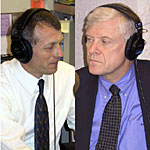By Laura McCallum
Minnesota Public Radio
May 13, 2002
Minnesota lawmakers are still trying to work out the details of a budget-balancing bill. Legislative leaders reached agreement on the framework of the bill over the weekend, but sticking points remain. They don't have much time; if they want to override a possible veto by Gov. Ventura, they say they have to pass the bill by noon Tuesday.
| |
|
|
|
||
Legislative leaders agreed to delay state payments to school districts and counties to address the remaining 439-million dollar projected deficit. The House and Senate disagree over how to replenish the state's budget reserves. The rainy-day fund was depleted during the first round of budget balancing.
The lead House negotiator on the budget conference committee, Rep. Kevin Goodno, R-Moorhead, says the House wants to use tobacco endowment money set aside for smoking prevention.
"We'd be willing to even put a mechanism in place where the endowment is replenished over time when there are surpluses. But they have a strong position about going into the endowment at all," Goodno said.
"Tax increases and tobacco endowments are off the table," countered the lead Senate budget negotiator, Sen. Doug Johnson, DFL-Tower, who says Senate Democrats won't raid the tobacco endowments. His caucus has proposed restoring the budget reserves with $245 million earmarked for transportation projects. The projects would still go forward, but the state would borrow money for them instead of paying cash.
If the House and Senate can't agree on a way to replenish the reserves, Gov. Ventura is likely to veto the budget bill. "We do not want to put the state's credit rating at risk. And that may be the straw that breaks the credit rating camel's back," says John Wodele, Ventura's spokesman.
Legislative leaders are preparing for the possibility that Ventura could veto the budget bill regardless of whether it rebuilds the reserves. Republican House Speaker Steve Sviggum of Kenyon says he doesn't think Ventura will find any budget-balancing bill acceptable.
"My sense is the governor will veto any bill that we send to him, and because of that, Sen. Moe and I are talking about the scheduling being the potential veto override," according to Sviggum.
Sviggum and Senate Majority Leader Roger Moe, a DFL gubernatorial candidate from Erskine, say they must get the bill to Ventura by the end of the day Tuesday. That would give the Legislature time to override a veto before the May 20 deadline. The pressure to finish the budget bill has pushed other issues to the background. Leaders say they may not be able to agree on a transportation funding package this session.
Moe says the latest House offer of a three-cent gas tax increase with no money for transit operations isn't acceptable.
"If the demographers are correct, and if 15 and 20 years from now, this metropolitan region is going to be between three-fourths of a million and a million people more, you can't do it just by building roads and bridges. You're not going to be able to accommodate the growth, you're going to stifle economic growth, and you are going to, in fact, have environmental impacts that are negative," Moe said.
The Senate's latest transportation offer raises the gas tax by five-cents a gallon. It also creates a multi-modal fund that could be used to pay for the operation of light rail and commuter rail. Speaker Sviggum says that plan won't pass the House, and the Senate should accept something rather than nothing. Other unresolved issues include a bonding bill and anti-terrorism initiatives. Ventura spokesman Wodele says the governor isn't surprised that one week before the constitutional deadline for adjournment, lawmakers haven't finished their work.
"He actually felt all along that the Legislature would not change its behavior this year, and if you look at past behavior, the indications always point to the fact that they use every last second of their time," Wodele said.
Wodele says Ventura's top priority is a long-term budget fix that doesn't delay tough decisions until next year. Wodele says if lawmakers use accounting shifts to balance the budget, the next Legislature will have to raise taxes or make significant cuts in education, local government aid and other state programs.
More from MPR
